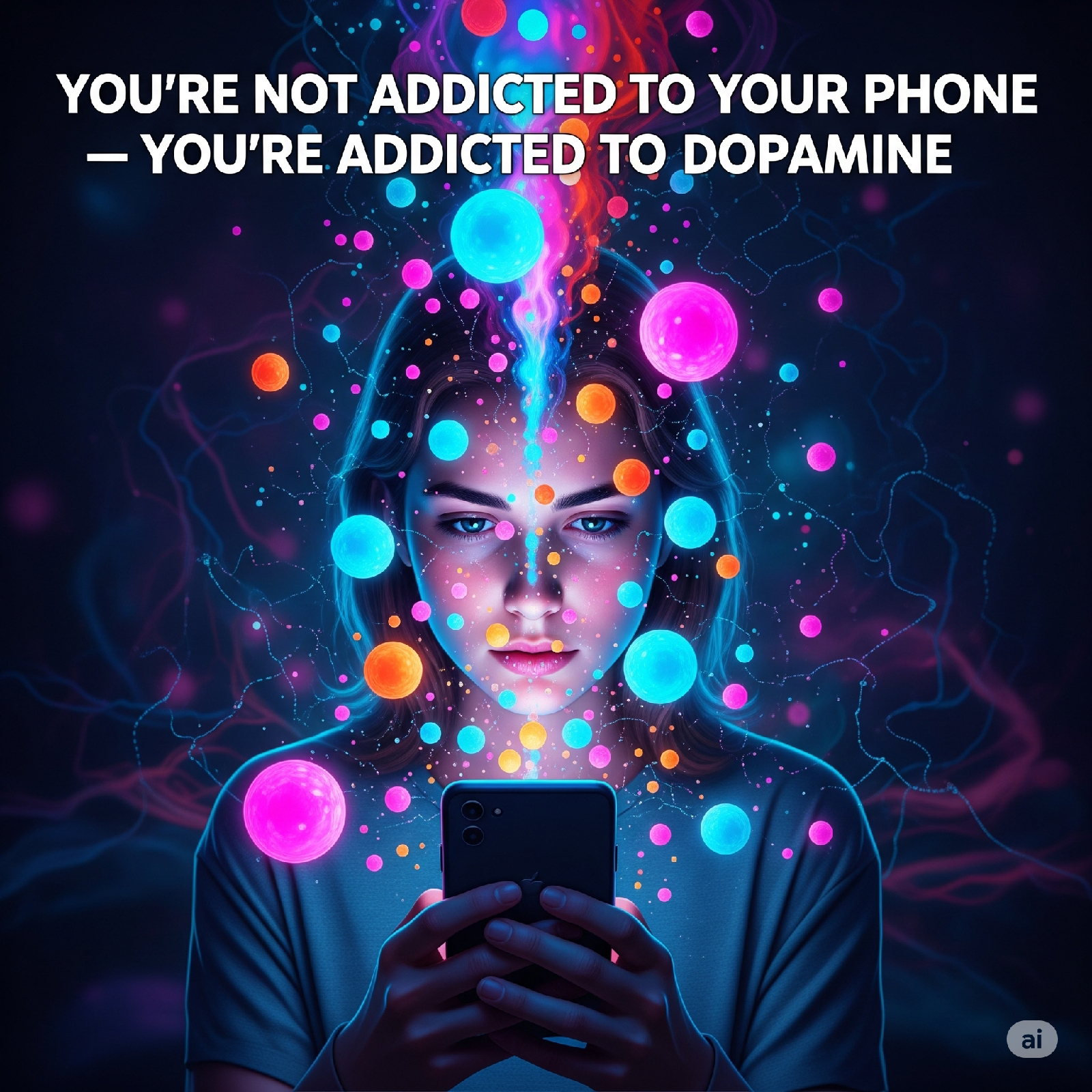You’re Not Addicted to Your Phone — You’re Addicted to Dopamine
The Neuroscience Behind Scroll Addiction, Restlessness, and the Decline of Deep Joy
By Dr. Manju Antil, Counselling Psychologist & Assistant Professor
Introduction
Most people think they're addicted to their phones. But the truth is more precise—and more unsettling:
We are not addicted to our phones. We are addicted to what our phones do to our brains.
At the center of this addiction is dopamine, a neurochemical that plays a crucial role in motivation, pleasure, and reward. In today’s tech-driven world, our dopamine circuits are being hijacked by algorithms, endless scrolls, and digital rewards—and it’s changing not just how we behave, but how we think, feel, and connect.
This article unpacks how dopamine shapes our daily actions, why we're stuck in compulsive content loops, and how we can break free before our attention, creativity, and emotional well-being are permanently compromised.
What Is Dopamine—and Why Does It Matter?
Dopamine is a neurotransmitter—a chemical messenger in the brain that signals reward, anticipation, and motivation. It plays a major role in:
- Feeling pleasure
- Forming habits
- Driving motivation and action
- Reinforcing behaviors that feel rewarding
In a natural setting, dopamine spikes when we achieve something meaningful—solving a problem, connecting deeply with others, or experiencing beauty in nature.
But in the digital world, dopamine is artificially triggered hundreds of times a day—by likes, notifications, messages, new videos, and algorithmic suggestions designed to keep us hooked.
How Your Phone Manipulates Your Brain’s Reward System
1. The Dopamine Loop
Each time you check your phone and get a new message, like, or scroll update, your brain receives a tiny dopamine hit.
This feels good, so you repeat the behavior.
This is called a dopaminergic feedback loop, and over time, it becomes compulsive.
You’re not just choosing to scroll—you’re chemically conditioned to do so.
2. Variable Rewards: The Casino Effect
Apps are designed like slot machines. You don't know what reward you'll get—sometimes it's a funny reel, sometimes a dramatic update.
This uncertainty makes your brain crave more.
Psychologically, this is known as intermittent reinforcement—the most addictive reward pattern ever studied.
3. Low-Effort, High-Stimulation Rewards
Opening a book or having a meaningful conversation takes effort.
Scrolling through 50 videos takes none—yet floods the brain with novelty and stimulation.
Over time, your brain prefers high dopamine for low effort, reducing your interest in deep, fulfilling activities.
Case Insight: “I Can’t Stop Even When I Want To” – Aarav, 22
Aarav, a university student, came to therapy saying:
“I open my phone just to reply to a message, and suddenly I’ve spent 40 minutes watching videos I don’t even care about.”
He wasn’t lacking willpower.
He was neurologically looped into a reward system that had replaced reflection, rest, and reading with compulsive stimulation.
With time, Aarav had lost interest in long-term goals, deep conversations, and even activities he once enjoyed.
He was not “addicted to his phone”—he was experiencing dopamine depletion from overexposure.
Dopamine Depletion: The Hidden Cost
When the brain receives too many artificial dopamine spikes, it begins to downregulate—meaning, it produces less dopamine naturally or becomes less sensitive to it.
This results in:
- Chronic boredom
- Low motivation
- Emotional flatness
- Anxiety or agitation when not stimulated
- Inability to enjoy slow or quiet moments
This is why many young people today report feeling:
“Nothing excites me anymore.”
“Even resting feels anxious.”
“I keep switching tasks but don’t feel fulfilled.”
These are symptoms of a neurologically fatigued reward system.
Why Deep Joy Is Disappearing
Dopamine addiction teaches the brain to seek quick, shallow pleasures—not deep, meaningful satisfaction.
Over time, we stop enjoying:
- Reading books
- Meaningful face-to-face conversations
- Quiet solitude
- Creating art or thinking deeply
We become emotionally “numb” to slower forms of happiness—what psychologists call anhedonia, or the inability to feel pleasure from previously rewarding activities.
The Link Between Dopamine and Mental Health
- Depression: Dopamine dysregulation is linked to reduced motivation, emotional flatness, and loss of joy.
- Anxiety: The constant chase for stimulation causes mental restlessness and a feeling of being “never settled.”
- ADHD-like symptoms: Frequent switching of tasks, reduced attention span, and impulsivity mimic ADHD even in people without a formal diagnosis.
- Sleep Disorders: Dopamine spikes close to bedtime (via screens) suppress melatonin, disturbing sleep-wake cycles.
How to Reclaim a Healthy Dopamine Balance
1. Dopamine Fasting
Set aside 2–3 hours a day without phone use, digital input, or quick-reward activities.
Initially uncomfortable, this gives your brain space to recalibrate and rebalance.
2. Replace Stimulation with Presence
Choose one slow activity daily:
- Walk in nature
- Read a print book
- Paint or journal
- Sit quietly with music or silence
Train your brain to enjoy slowness again.
3. Intentional Screen Use
Ask before opening your phone:
“What exactly am I here to do?”
Avoid mindless browsing. Use tech as a tool, not a trap.
4. Rebuild Natural Rewards
Engage in behaviors that stimulate dopamine naturally and sustainably:
- Physical exercise
- Learning something new
- Completing a creative project
- Acts of kindness
- Achieving small, non-digital goals
Final Reflection
We are not just overstimulated—we are neurochemically unbalanced.
The good news is that the brain is plastic. With intention and repetition, we can restore balance, deepen joy, and recover focus.
But it starts with awareness. It starts with asking:
“Am I choosing this behavior—or am I chasing dopamine?”
The goal is not digital detox—it’s dopamine discipline.
Stay Connected
For more insights on mental health in the digital era, attention restoration, and youth psychology, follow my professional platforms:
- YouTube: Dr Manju Antil – Counselling Psychologist
- Instagram: @psychologistmanjuantil
- Twitter: @psychologistmanjuantil
- Facebook: @psychologistmanjuantil
- LinkedIn:
- Website: www.psychologistmanjuantil.com
Written by
Dr. Manju Antil
Psychologist | Assistant Professor | Digital Wellness Educator





















.jpg)




No comments:
Post a Comment